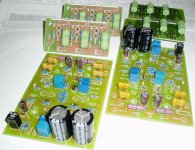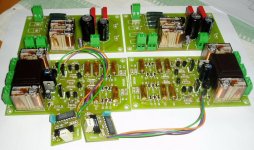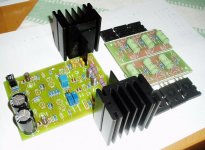Mark A. Gulbrandsen said:
There are also available stainless steel star type washers as well as regular type stainless lock washers.
Yes, they have to be insulated with what ever you prefer to use...... These devices have full rail potential on the collectors(metal tab). I use ceramic-alumnium oxide insulators on all my devices cause I can get em cheap at surplus.
Mark
Hummmm Mark do you use plastic srews?
Regards
Anthony
Hummmm Mark do you use plastic srews?
I have used them on a few occasions in a pinch! Later on to be replaced by the real thing.
Mark
still4given said:Don't Q107 & 108 need heatsinking?
Terry,
if you look at the datasheet for the 15032/33 you can see 2 power figures: 50 watts and 2 watts, for Tc and Ta.
In the Safe Operating Area graph there are 2 lines as well, one for Tc, the other for Ta.
Ta is for ambient, without heatsink.
Tc for cooled, with infinite large heatsink.
Means the MJE's can dissipate 2 watts at 25C without cooling, even at 55C they do 1.5 watts without heatsink.
Even under the worst load dissipation of Q107 and Q108 is a fraction of what they can handle without heatsink.
Which is good, because they will only heat up a little, in return that will keep their parameters fairly constant.
Input sensitivity
Hi Lgreen,
output voltage depends on your +-Vrail and gain.
Assuming you have +-38Vdc and the losses from rail to max output voltage are 4v then you have 34Vpk to drive your load.
Divide by sqrt 2 = 1.4142 to give rms output = 24.04Vac (72w into 8R)
The gain of amp = r130/r129 + 1 = 22/1.5 + 1 = 15.67
Input required to produce 24.04V = 24.04/15.67 = 1535mV
From this you can insert any gain resistor values and max output voltage to determine the maximum input voltage.
Here's another Wiki.
Hi Lgreen,
output voltage depends on your +-Vrail and gain.
Assuming you have +-38Vdc and the losses from rail to max output voltage are 4v then you have 34Vpk to drive your load.
Divide by sqrt 2 = 1.4142 to give rms output = 24.04Vac (72w into 8R)
The gain of amp = r130/r129 + 1 = 22/1.5 + 1 = 15.67
Input required to produce 24.04V = 24.04/15.67 = 1535mV
From this you can insert any gain resistor values and max output voltage to determine the maximum input voltage.
Here's another Wiki.
neychi said:I'm steel sleeping. 1R, 4.5W, 5% of course.
Dean,
any idea who the producer is of the 922's you are using ?
Mark A. Gulbrandsen said:
Well, you can put a thin layer of anti-oxide compound on these metals and then it will not oxidize. That may be too simple though for some to grasp.
Believe me, I've dealt with brass, coper and aluminium for a long time (making telescopes). It is not as easy as "putting a thin layer of anti-oxide compound". From my experience the only way to definitely stop oxydising these metals is to actually OXYDIZE them (copper/brass blackening and Al anodizing) or completely remove them from the atmosphere (epoxy paints, powder coating. Both not that good for conductivity at all).
Admitedly, telescopes cop a fair bit more than amps (getting wet/dewy/frosted, severely thermally cycled etc.), but why not overkill ? It's cheap.
BTW: Silver tarnishes, it doesnt oxidize.
Fair enough. Semantics are important I guess.
Nevertheless, it's good to remember that silver sulphide is has SEMICONDUCTOR properties. Not good at all for a bus bar.
You bet ya. Some people on this thread are way too worried about other infinatestimal things that will have such minute affects as to be unmeasurable, let alone ever audible. Now if those folks would just go build themselves a KSA-50 and get it over with.........
Yup. Unless they have already built KMA 200 clone, that is
Believe me, I've dealt with brass, coper and aluminium for a long time (making telescopes). It is not as easy as "putting a thin layer of anti-oxide compound". From my experience the only way to definitely stop oxydising these metals is to actually OXYDIZE them (copper/brass blackening and Al anodizing) or completely remove them from the atmosphere (epoxy paints, powder coating. Both not that good for conductivity at all).
Certainlly agreed. I was assuming that the anti oxide compound would be used on things that only get handled once during assembly such as electrical connections(since thats what we are discussing here). It works great on alumnium wiring of which there is still quite a bit being used in the U.S.. Things that get handled alot certainly need a protective coating. But then on things like telescope parts its just to maintain the beauty of the parts, not the functionallity of them.
Mark
Dean, are these the items you're reffering to?
# EB-600/312 Delayed Turn-On and Muting Circuit
# EB-292/132 Delay and DC-Protection Circuit for Loudspeakers
Do they come as a complete kit or only the PCB's because I can't quite make that up from Borbely's site. If it's only the boards it looks rather expensive
Cheers
# EB-600/312 Delayed Turn-On and Muting Circuit
# EB-292/132 Delay and DC-Protection Circuit for Loudspeakers
Do they come as a complete kit or only the PCB's because I can't quite make that up from Borbely's site. If it's only the boards it looks rather expensive
Cheers
- Home
- Amplifiers
- Solid State
- Krell KSA 50 PCB




